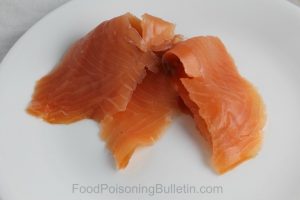New research published at Nofima, the food research institute in Norway, has found that Listeria can be eliminated on fish by treating the surface with 100 degrees C (212 degrees F) steam for a few seconds. Listeria is a problem in the seafood industry, especially smoked fish and fish pates that are eaten without reheating.
 Those chilled products with a longer shelf life are more vulnerable to the Listeria bacteria because it is omnipresent and can grow at temperatures below 40 degrees F. In addition, Listeria is the most heat resistant of non-spore forming pathogens. Short time, high temperature surface treatments target contamination without causing “unwanted thermal degradation.” Since fish is so sensitive to heat, most treatments cook the fish and can make it tough and dry.
Those chilled products with a longer shelf life are more vulnerable to the Listeria bacteria because it is omnipresent and can grow at temperatures below 40 degrees F. In addition, Listeria is the most heat resistant of non-spore forming pathogens. Short time, high temperature surface treatments target contamination without causing “unwanted thermal degradation.” Since fish is so sensitive to heat, most treatments cook the fish and can make it tough and dry.
In the research, Listeria monocytogenes strains isolated from fish processing environments. Cooked surimi was inoculated at high and low levels, then the fish was subjected to steam surface pasteurization. There was an initial 1-2 log reduction with no further reductions with increasing processing time, up to 20 seconds.
This treatment is used in animal slaughter houses and in the poultry industry, but hasn’t been used with fish very often. More research is needed to find the best possible combination of temperature and time and how to treat uneven surfaces, when bacteria can hide in crevices and lines.




